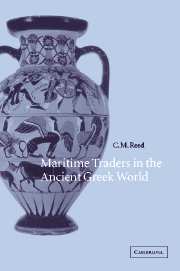Book contents
- Frontmatter
- Contents
- Acknowledgments
- List of abbreviations
- List of references to Greek terms
- Maps
- Introduction
- Chapter 1 Coming to terms
- Chapter 2 Classical modes and patterns of exchange
- Chapter 3 The juridical place of maritime traders
- Chapter 4 The level of wealth of maritime traders
- Chapter 5 Official attitudes towards maritime traders
- Chapter 6 Unofficial attitudes toward maritime traders
- Chapter 7 Archaic modes of exchange and the personnel involved c. 800–475 b.c.
- Chapter 8 Conclusion: then and now
- Appendix 1 Emporoi and nauklēroi: their attested states of origin
- Appendix 2 Cohesion among maritime traders
- Appendix 3 The dikai emporikai
- Appendix 4 Catalogue of emporoi and nauklēroi
- Bibliography
- Index locorum
- General index
Appendix 3 - The dikai emporikai
Published online by Cambridge University Press: 22 September 2009
- Frontmatter
- Contents
- Acknowledgments
- List of abbreviations
- List of references to Greek terms
- Maps
- Introduction
- Chapter 1 Coming to terms
- Chapter 2 Classical modes and patterns of exchange
- Chapter 3 The juridical place of maritime traders
- Chapter 4 The level of wealth of maritime traders
- Chapter 5 Official attitudes towards maritime traders
- Chapter 6 Unofficial attitudes toward maritime traders
- Chapter 7 Archaic modes of exchange and the personnel involved c. 800–475 b.c.
- Chapter 8 Conclusion: then and now
- Appendix 1 Emporoi and nauklēroi: their attested states of origin
- Appendix 2 Cohesion among maritime traders
- Appendix 3 The dikai emporikai
- Appendix 4 Catalogue of emporoi and nauklēroi
- Bibliography
- Index locorum
- General index
Summary
The dikai emporikai (“private cases involving maritime traders”) constitute an important category under the rubric of Chapter 5 – “Official Attitudes to Maritime Traders” – for they unmistakably reflect Athens' willingness to afford special procedures to the emporoi and nauklēroi trading with Athens in the mid-fourth century. I deal here with this topic only because the problems surrounding it require more discussion than footnotes permit.
Before broaching these problems, I must mention a number of issues on which most scholars agree. Prior to the mid-fourth century special legal procedures for maritime trade already existed, but by c. 352 b.c. Xenophon can doubt if these are sufficiently rapid to accommodate traders: in Vect. 2.3 he argues for “fastest possible” legal actions, “so as not to detain anyone who wished to sail out” of Athens. By the 340s b.c. Athens seems to have responded to just such a need: the term dikai emporikai first appears in D. 21.176 (? 347/6); and from D. 7.12 we learn that at some point prior to the date of that speech (343/2 b.c.) “the emporikai dikai were not as now … monthly” (kata mena, elsewhere emmenoi). So at some point between 355 and 343/2 b.c. Athens instituted more convenient “monthly” arrangements for the settlement of legal disputes involving maritime traders, doubtless to continue attracting more of them in a period when the prosperity once guaranteed by power had waned.
- Type
- Chapter
- Information
- Maritime Traders in the Ancient Greek World , pp. 89 - 92Publisher: Cambridge University PressPrint publication year: 2003



